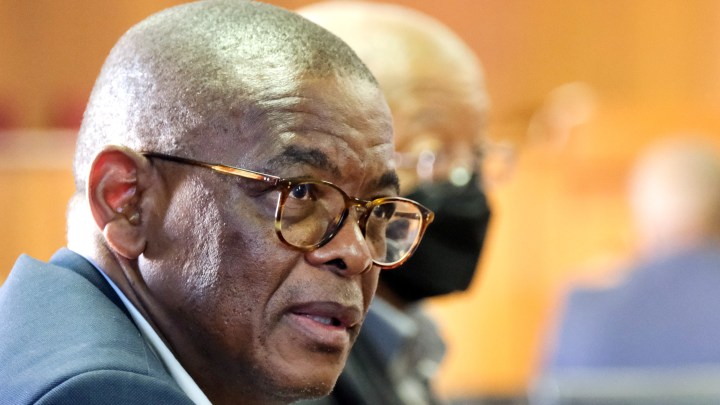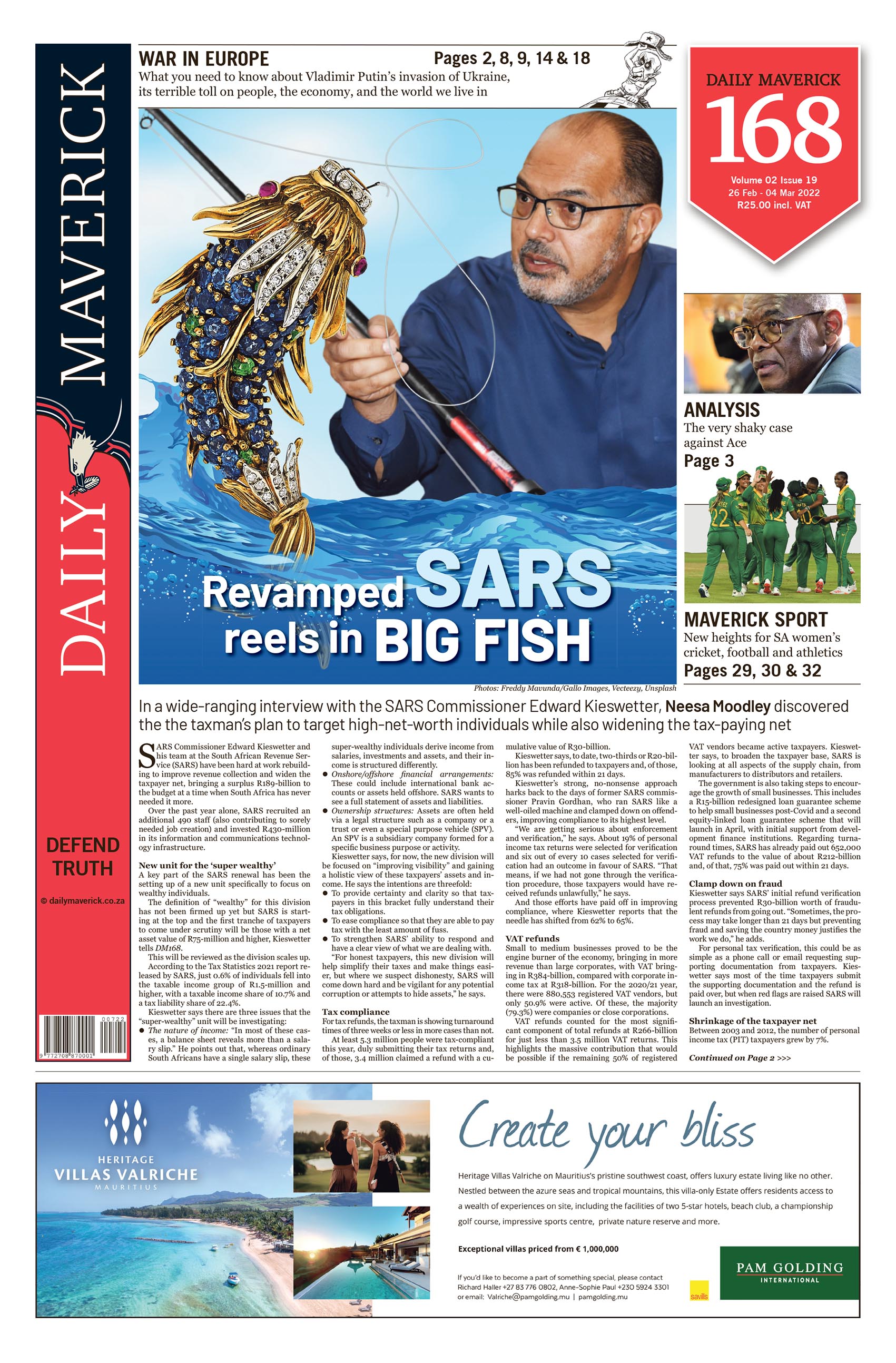ANALYSIS
The case against Ace: Why Magashule may not end up behind bars soon

Ace Magashule argued this week that corruption charges against him should be dropped. That probably won’t happen, but the National Prosecuting Authority's case against him does not seem strong enough to guarantee a conviction.
Ace Magashule is facing 21 counts of fraud, corruption and money laundering – yet his lawyers this week argued that the case against him should be chucked out before it even gets to court. Advocate Laurence Hodes, appearing for Magashule in the Bloemfontein High Court, accused the State of repeated procedural errors in the handling of the suspended ANC secretary-general’s case, which amount to a violation of his basic rights as an accused.
State prosecutor Nazeer Cassim in response charged Hodes with making an argument riddled with “misrepresentation and dishonesty” – with some justification. In court, for example, Hodes claimed that the State now only wishes to pursue three charges against Magashule, as opposed to the 21 listed in the original indictment.
National Prosecuting Authority (NPA) spokesperson Mthunzi Mhaga told DM168 that this is categorically untrue, saying: “We refute the claims of amended charges” and “we still stand by the indictment served on the accused”.
Both Hodes and Magashule himself – the latter in interviews in recent years – have also sought to depict Magashule as being charged merely with a “failure to exercise oversight”, which is clearly equally untrue. That Magashule should make this false claim as a politician desperately trying to redeem his reputation is perhaps understandable, if not justifiable; that Hodes should do so, as an officer of the court, is distinctly less so.
But the effect of both Hodes and Magashule’s inaccurate representations has been to surround the case with a dust cloud of confusion that this week’s court proceedings did little to dispel. The fact that DM168 had to seek clarification from the NPA after judgment was reserved about how many charges Magashule is indeed now facing is an indication of that.
The situation has not been helped by some iffy reporting from the media, with some journalists clearly confused about the distinction between the civil litigation heard this week, the pre-trial hearings for the corruption case in which Magashule and 16 others are accused, and the corruption trial itself. Even Judge Soma Naidoo seemed rattled at times, reminding herself to change between the red robes required for the criminal proceedings and the black robes donned for the civil litigation.
In short, the situation is as follows: Magashule and 16 others are charged with multiple counts of fraud, corruption and money laundering relating to irregular contracts amounting to R255-million issued by the Free State government under the premiership of Magashule in 2015 to audit houses for traces of toxic asbestos. That corruption trial has yet to start. The purpose of this week’s proceedings was twofold: to continue with pre-trial hearings in that matter, and to hear a separate application brought by Magashule and three others to have the charges against them dropped ahead of the corruption trial.
The confusion surrounding matters cannot entirely be blamed on the conscious disingenuousness of Magashule and his lawyers, or the befuddlement of journalists. There is no doubt that, in a number of respects, the State’s handling of the charges against Magashule has been less than ideal. It was initially indicated by the NPA that Magashule’s former personal assistant, Moroadi Cholota, would be their star witness. What has subsequently emerged is that this announcement was made before Cholota had made a sworn statement, and it then became clear that Cholota was not, in fact, willing to implicate Magashule in her capacity as a state witness.
Prosecutors then opted to charge Cholota along with Magashule and the 15 other people accused in the corruption trial. But Cholota is now based in the US, and the NPA has to apply for her extradition to South Africa to face charges. This alone ensures significant further delays to the start of the corruption trial, with an update on the extradition proceedings to be delivered at the next pre-trial hearing in June.
Advocate Hodes argued in Magashule’s application to have his charges dismissed that it was clear from emails between the NPA and Cholota that at the time of Magashule’s arrest – 10 November 2020 – negotiations with Cholota were still ongoing. In other words, Magashule was arrested with prosecutors still banking on Cholota singing like a canary in court and thus sending her former boss to jail. Cholota’s subsequent refusal to cooperate with the NPA would surely have significantly weakened the State’s case against Magashule, Hodes contended, with the additional argument that to arrest Magashule while the case against him was still largely unresolved violated his rights.
The State’s Cassim responded irritably that the Cholota saga was a “dead issue” and that Hodes should “move on”. Cassim added that it was by no means unusual for the State to add to a case after the arrest of any accused in a criminal matter as new evidence came to light. But there is no question that the bungling of the Cholota matter has not reflected well on the NPA, which can credibly be accused of jumping the gun in its haste to arrest Magashule in a way that regrettably bolsters Magashule’s claims that his prosecution is politically motivated.
The chances of Judge Naidoo dismissing Magashule’s charges altogether based on this and other procedural missteps alleged by Hodes seem very slim: aside from anything else, the judge was repeatedly reminded by Cassim that she could justifiably rule that all these matters are best assessed by the trial court once the corruption proceedings get under way.
But another aspect that became uncomfortably evident in the course of the two-day hearings at the Bloemfontein High Court is that the evidence against Magashule in the asbestos matter is not as strong as might be expected.
This is hugely frustrating given that the man at the heart of this was reportedly quite widely referred to as “Mr Ten Percent” while serving as Free State Premier owing to the known requirement that a 10% cut of each contract awarded by his government be reserved for Magashule and his allies.
It is also not totally surprising, however. In Daily Maverick journalist Pieter-Louis Myburgh’s 2019 book Gangster State: Unravelling Ace Magashule’s Web of Capture, Myburgh explicitly warned of the potential difficulties of directly pinning Magashule to corruption.
“Magashule had been extremely careful in his alleged dealings with contractors and other businesspeople, some of his former associates told me. Kickbacks due to him from government contracts would be paid in cash, they all alleged, ensuring that any financial links to dodgy contractors were kept to a minimum. Furthermore, Magashule apparently often used trusted security guards, drivers and other aides to do his dirty work,” Myburgh wrote.
“He also avoided electronic communication and preferred to discuss ‘funny money’ and related matters in person. Some of my sources feared that if the Hawks and other law-enforcement bodies were to one day wake from their Zuma-induced slumber, they would have a difficult time finding any conclusive evidence of Magashule’s involvement in corrupt government deals.”
What the State has: evidence, in the form of emails and bank records, that Magashule’s office asked businessman Igo Mpambani – subsequently assassinated by persons unknown – to pay for the university fees of a Gupta ally’s daughter; to buy 200 electronic tablets for distribution to students; to pay R30,000 to an individual identified only as “SWC Nkate”; and to make a contribution towards the travel expenses of Magashule and other politicians on a visit to Cuba.
Mpambani was one of the businessmen who directly benefited from the wildly inflated R255-million Free State asbestos contract, so the implication is perfectly clear to anyone with an ounce of common sense: Mpambani’s payments were made at the behest of Magashule’s office as payback for his irregular contract. But the threshold for conviction in criminal proceedings is, sometimes fortunately and sometimes unfortunately, much higher than merely satisfying common sense deductions. The State has to prove that link with empirical evidence.
Cholota has already told the Zondo Commission, for instance, that it was perfectly common for any number of people – artists, students, etc – to email the Premier’s office asking for financial assistance, and that the Premier’s office would accordingly seek such assistance from wealthy donors of all kinds. Magashule’s lawyer Hodes suggested in court that this was, in fact, “quite commendable”. Magashule also enjoys a high level of plausible deniability because it does not appear that he personally authored any of the emails soliciting payments. They were written by Cholota and sent “from the Premier’s office”.
Myburgh’s book makes reference to numerous other signs pointing to the fact that Mpambani and Magashule had a corrupt relationship, including a spreadsheet created by Mpambani and his business partner that appeared to lay out the payment of bribes to one “AM”, and the fact that records of Magashule and Mpambani’s movements suggest that Mpambani appears to have followed Magashule around the country with ATM card at the ready. It’s unclear, however, how much of this would be admissible in court. It’s also unclear whether the State has further strong evidence up its sleeve against Magashule that it doesn’t want to reveal just yet, although Cassim gave little sign of this being the case in court this week.
Ironically, then, the strongest charge against Magashule may indeed end up being the one misleadingly glossed by him and his lawyer as a “failure to exercise oversight”. It is uncontested that the DA raised its concerns about the asbestos audit in June 2015 and thereafter launched a High Court application to try to thwart it. There is no plausible world in which Magashule could have been unaware of these developments, but the fact that he made no effort to stop further payments being made is evident from the R139-million paid out after this.
The asbestos fraud is by no means the only corruption scandal in which Magashule has been implicated, as Myburgh’s book made clear, but it is the only one in which he has faced charges to date. If the NPA cannot secure a conviction against Magashule in this matter it will be a massive setback for attempts to bring some semblance of overdue justice and accountability to the Zuma years. It will also give renewed licence to the Radical Economic Transformation faction of the ANC, of which Magashule is a leading figure, to claim that State Capture prosecutions are motivated by little more than political malice. It will, in short, be disastrous. DM168
This story first appeared in our weekly Daily Maverick 168 newspaper which is available for R25 at Pick n Pay, Woolworths, Exclusive Books and airport bookstores. For your nearest stockist, please click here.





















 Become an Insider
Become an Insider
So essentially if he cannot be convicted for corruption he should be convicted for negligent incompetence. The project’s numbers speak for themselves.
Jessica, interesting that Karyn Maughan, whom freelance for News24, share your opinion. The NPA’s case indeed appears weak, and if Ace is not convicted, it will have dire consequences, not on for the NPA, but for the whole of South Africa. The only hope appears to be that the NPA charge him for some other corruption cases, such as the Estina project, and there are likely many more.
Can’t the Authorities responsible for law and order use the skills of the techy wizards to trace Magashule’s wealth? If I remember correctly, Myburgh stated in The Gangster State that Igo made a side trip to the Cayman Islands during Magashule’s trip to Cuba. Start digging in the Cayman Islands?